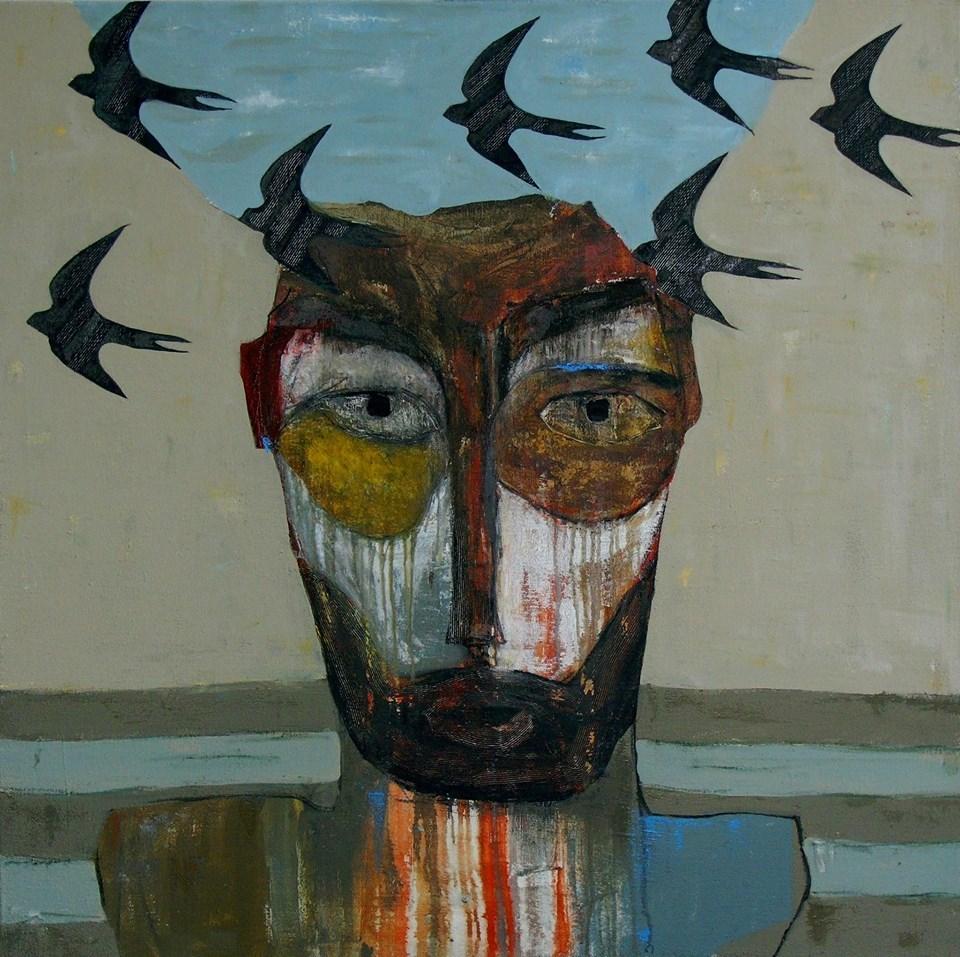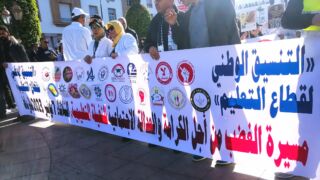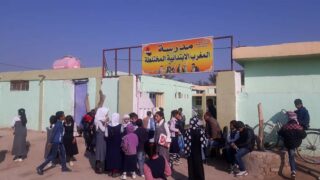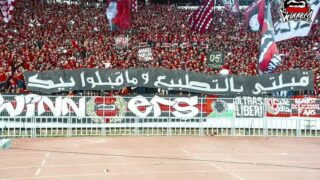
This publication has benefited from the support of the Rosa Luxemburg Foundation. This text may be reproduced in part or in full, provided the source is acknowledged.
After repeated failed attempts,, “David” realized he must not continue to take the risks of migrating towards Europe. He decided to settle in Morocco, perhaps temporarily, just like the other sub-Saharan migrants who are estimated to be around 30 thousand. The journey leading to Morocco was not an easy one. It was, actually, hell on earth, shared with his peers, along distances that started from the departure point, his country, “The Democratic Republic of Congo”.
He is now settled in Morocco, not out of love for this country, but because the prospects of migrating “beyond the sea” have become minimal.
The European “Eldorado” closes its doors
During the last decade, accessing the European Eldorado (1) has become almost impossible. The European Union has adopted very strict security policies to avoid infiltrations. The doors have been locked. The high fences erected in Ceuta and Melilla, the two Moroccan cities occupied by Spain, are symbols of that. The double barbed fences, equipped with sound and motion sensors and powerful flashlights, are 6 meters high and extend over 12 kilometers around Melilla and 8 kilometers around Ceuta. The construction of the first one started in 1998 and of the second one in 2001. It was financed by the European Union through “Frontex” which is “the European border and coast guard patrol Agency”. The overall cost was 66 million Euros. In a report published on November 2015, the American newspaper “Wall Street Journal” demonstrated how those fences were extremely effective. Embarking through the Gibraltar strait – which separates Africa from Europe by a mere 14 kilometers – has also become impossible due to the accurate technological means, the thermal detection cameras and sea patrols. The Wall Street Journal stated that Morocco was a laboratory in the field of limiting irregular immigration. The total number of immigrants who has managed to cross towards Europe has been almost halved in 2017 if compared to the numbers of 2016. The International Organization for Migration (IOM) recorded the arrival of 171635 migrants to Europe by boat in 2017, while 363504 migrants were recorded in 2016.
But those surveillance policies, in spite of successes, did not eliminate the infiltration of migrants, or at least, didn’t deter their attempts to reach the opposite shores. Each year, recurrent breaches are registered in the two border crossings of Ceuta and Melilla. The events of the 26th of July 2018 (*) were, until now, the most spectacular, as more than 800 migrants tried to collectively cross the security fence in the occupied city of Ceuta. The Moroccan authorities arrested a hundred of them, while others were arrested by the Spanish forces who repatriated them. However, more than 600 persons managed to cross over the doubled barbed fence. Press sources have reported that, while facing the Spanish border guards and to impeach their arrests, the migrants had resorted for the first time to “violent means”, such as throwing limestones, flammables and stool.
Why do sub-Saharans come to Morocco?
Mamadou: fleeing war
Mamadou (2) (a 30 year-old who has fled Mali) recounts his sufferings due to the reigning insecurity in his country of origin after the growing activity of the extremist “Boko Haram” group in 2011.
He says: “I have seen with my own eyes pieces of my father. His body was cut into pieces after a bomb felt into our home… The view was terrible… It was then that I decided to save my own life”. For Mamadou, leaving did not have anything to do with making a better life for himself as much as it was a question of life or death. The destination is not important; whether Morocco will be his final stop or just a transit country doesn’t matter to him as he is only interested in finding a secure and stable place. Like other sub-Saharan migrants, he went on a long journey fraught with hardships, dangers, difficulties and police chasing. Now, he would rather stay in Morocco: “Despite the difficulties in managing to put a roof over my head, some food on my table or getting a work in the beginning of my stay in Morocco, I have now acquired a certain security that allows me to stay here and live peacefully without feeling threatened”.
David: not running away from war
David (28 years old) (3) did not come to Morocco from the Democratic Republic of Congo because of war or ethnic conflicts. He came because of the difficult life conditions resulting from the exploitation of multinational companies. He says: “We used to own a lands as far as the eyes can see, we would eat the food we produced and live from its blessings. The lands were sold and we became homeless”. He describes the hardships he had faced after his family lost their lands which were not officially documented in the government services and were given to a Chinese corporation after a deal was done with the Moroccan government. David’s family migrated to the city hoping to find an opportunity there while he decided to leave and risk his life in order to reach Europe. The dream came to a stop in Morocco. After two years of failed attempts to reach Spain, David took the decision to stay, even if temporarily, in Morocco.
The origins of the problem
David is not the only one whose land was sold, exploited or acquired. The UN Food and Agriculture Organization (FAO) registered that around 115 million acres (an acre equals 4200-meter square or 0.42 hectares) were rented or invested in countries such as Ethiopia, Congo, Sudan and Madagascar, by Chinese corporations. A study published by the FAO in 2012 (entitled “trends and impacts of foreign investments in developing countries”) states that the total area of land deals in Africa reached 56.2 million hectares. (4)
The organization’s report warned that the majority of foreign investments does not target the local market but the export ones or biofuel production, which represents a threat to nutrition security in countries suffering from hunger and an ongoing food crisis as the new production replaces the essential food crops of the local market. The Organization added that this trend was resulting in the displacement of the small-scale farmers, the loss of cultivable lands and living revenues for the rural inhabitants and the degradation of natural resources such as water and land.
The UN Food and Agriculture Organization (FAO) registered that around 115 million acres were rented or sold in countries such as Ethiopia, Congo, Sudan and Madagascar… In January 2009, Saudi Arabia received the first cedar trees uprooted from the land it exploited in Ethiopia, in times when the “World Food Program” was providing food for 5 million hungry Ethiopians…
The Oxfam organization states that the investors were targeting the most vulnerable countries to acquire land for prizes as cheap as 1 dollar for each rented hectare. It added that the 23 poorest countries in the world had provided for more than half of the done deals between the years 2000 and 2011. It is believed that the transactions which involve nearly 200 million hectares of land advantaged, in most cases, the speculators over the local communities.
Starvation, land deprivation and impoverishment are crimes that fall under the responsibility of the powerful and economically wealthy countries. This is not a myth but a reality confirmed by the American environmental expert Lester R. Brown in his book “World on the Edge” (5), where he states that European countries encourage investors to take possession of agricultural land in Africa to produce biofuel for the European market(6). Lester also reveals that “in January 2009, Saudi Arabia received the first cargoes full of uprooted cedar trees from Ethiopian exploited lands while, at the same time, the World Food Program was feeding 5 million starving Ethiopians”. The same thing happened in the Democratic Republic of Congo where China took possession of 7 billion hectares of land to produce palm oil while millions of people from the Democratic Republic of Congo rely on international assistance to cover food shortage.
Less than a life in Morocco
In 2013, Morocco opened a new chapter in the folder of sub-Saharan migrants. It enacted a new law to grant regular residence for all migrants and asylum seekers. Thus, it was no longer a temporary transit country and became a country of permanent residence for migrants. By the end of 2014, the situation of more than 18 thousand migrants had been regularized and in 2016, the situation of 25 thousand others was also regularized while the government promised the treatment of all remaining cases.
Sub-Saharan migrants are underemployed and engaged, daily, in activities of the parallel economy. In most cases, they work as unlicensed hawkers on street sides and corners or in undeclared jobs in the construction sector and in other arduous labor. In other cases, they take up beggingto afford their stay in the country or to collect enough money to pay for their journey to Europe.
Moussa: Life in Morocco is not easy
Moussa (7), born to a Cameroonian father and a Guinean mother, recounts his attempts to reach the European Eldorado and the responses of the Moroccan and Spanish security forces. He says: “I have tried irregular immigration by boat, but even when I managed to cross the peninsula of Melilla, I was sent back to Morocco”. 5 years after the refusal of his political asylum application in one of the European countries, he gave up on the idea, just like many other irregular migrants who were frustrated by their failed attempts to cross the border.
Moussa gave in to the situation and stayed in Morocco, resisting and seeking survival in the country in any way he can, despite all the problems he may face. “I do simple small things. Today, I try to live as I can according to my traditions and inside my own circle and community. But despite that, life in this country remains very difficult, we are not welcomed by the Moroccans, we cannot integrate smoothly here”.
Migrants often face difficulties in their daily lives, Moussa says: “I do small jobs here and there. I had a job earlier where the employer seemed very happy with me in the beginning, but after using me, he refused to pay for the work I had done, pretexting that I was an irregular migrant and did not hold any official documents”.
Frank: humiliations and insults
Frank (35 years old) (8), a Nigerian migrant who fled the slaughtering of Boko Haram, says: “In Morocco, they put us in places where mentally ill people or people with infectious diseases reside. When we complained about this situation, the policemen answered: you are complaining about this situation but who do you think you are? You came to my county with your filth.” And he adds: “some taxi drivers refuse to take us in. They do not treat us in a respectful manner here, they insult us and talk about us in very bad racist terms like the word “Azi” which means “negro”. The beggars also despise us because they consider that we are less than them. To them, we are just trash”. (9)
David: no alternative to Morocco
“Today I work as an assistant to one of the Moroccan technicians specialized in telephone-repair, and because I have a diploma in informatics, I am proud to say that I am good at what I do. Some Moroccans are happy to see me in the store and praise my work, but others tend to not like me and, sometimes, even make fun of me. I have started a new life. This year, I will apply for residence in Morocco… Yes, I am Christian and not Muslim and that constitutes a stumbling block in integrating with the Moroccans, as some of them do not accept to deal with Christians so, most of the times, I don’t show my beliefs. I respect Islam and the Moroccan traditions. And, as you can see, I talk the Moroccan dialect which, in itself, helps me to integrate. The difficulties that I face sometimes bring me to think about escaping to Europe but not now because the journey is too risky. So despite all the problems, today, I have no other options than staying in Morocco”.
Mamadou: Despite everything, Morocco is more merciful
“After my painful experience in my country of origin, I don’t think of returning there nor do I even think of risking my life to go to Spain. To me, Morocco is more merciful at the moment. One day, I will go back to my country but not before the situation stabilizes. I am kind of integrated here since I have learned the Moroccan dialect and I can talk Arabic in addition to being of Muslim confession. All this has facilitated my life in this country. Still, the high cost of living is a problem, especially that it was quite difficult for me to find a decent work. I have a Masters in Economy but companies refuse to hire me as my situation is not regularized”.
How Moroccans view sub-Saharans and the problems of integration
Sub-Saharan migrants integrate among Moroccans but they remain cautious. In the beginning of the millennium, it was not accepted for a Moroccan to share their lives with a dark-skinned person. Today, the situation has relatively changed even though the majority still looks at them with contempt and racial discrimination.
Moroccans do not accept that the sub-Saharan migrants can benefit from all the rights that the Moroccan people enjoy, as they believe that the migrants must not be a priority given the socio-economic conditions that every Moroccan with low-income endures. Many consider that migrants are elbowing them for their daily bread and for their work in the informal activities in which more than 2.4 million Moroccans are involved.
Moroccans also consider that the presence of sub-Saharan migrants causes “an increased sense of insecurity, theft, beggary and squabbling”, according to the answers given by Moroccan interviewees in a survey conducted by “Sunergia Organization” in collaboration with the Moroccan review “L’Economiste” (published in March 2018). Another part of the population sees that the influx of migrants to the country has caused “competition in the labor market and provided a skilled labor force less expensive than the Moroccan one”. What statics say is that: the uneducated Moroccans are the most welcoming to sub-Saharan migrants (44%), followed by those with a primary education (42%) while 36% of those with university degrees have expressed their support to the integration of sub-Saharan migrants.
At the same time, according to a report issued by “the Moroccan Organization for Human Rights”, hatred and racism towards migrants are increasing after the occurrence of bickering and violent clashes between them and Moroccans in the city of Casablanca in November 2017. Just as the Organization sensed what it considered “a growing manifestation of social stigma and racial discrimination against them, as well as their privation from fundamental rights such as the right to health, water, food, housing, education and work”.
A study conducted by the German Institute “Heinrich Boell” in collaboration with “the Rabat Social Sciences Institute” and a group of Moroccan researchers (2017) confirmed that the policies of openness towards sub-Saharan migrants adopted in the previous years by Morocco neither guaranteed the protection of the migrants, focused on giving human, cultural, economic or social capital to them, nor contributed to integrating them into the Moroccan social, economic and cultural dynamics, adding that “the objectives of those policies are still shrouded in mystery, both at the administrative level and for the migrants themselves”.
In general, the sub-Saharan migrants have dreams bigger than remaining in Morocco and the image of the European paradise is still entrenched in their collective consciousness, even if those who have preceded them there have lived through conditions worse than those they are currently enduring in Morocco. They are not discouraged by the stories of the failed attempts and the deaths in the Mediterranean Sea; they still want to take their chances. Perhaps not all of them will take the risk eventually, but some of them surely will… For those whose conditions have worsened in Morocco, the country is narrowing down on them, exactly as it is narrowing down on the Moroccans who are also complaining from their own miserable life conditions.
The content of this publication is the sole responsibility of Assafir Al-Arabi and Rosa Luxemburg Foundation cannot accept any liability for it.
Translated from Arabic by Fourate Chahal Rekaby
Published in Assafir Al-Arabi on 19/07/2018
1- Eldorado or the myth of the Lost City of Gold in Latin America, which is a name commonly used among sub-Saharan immigrants and refers to the meaning of paradise or heaven.
2- An exclusive testimony for Assafir Al Arabi, all the names in this text are pseudonyms.
3- An exclusive testimony for Assafir Al Arabi.
4- Trends and Impacts of Foreign Investment in Developing Countries, part 1, introduction, page 5.
5- World on the Edge: How to Prevent Environmental and Economic Collapse, published by Routledge 2010, 144 pages.
6- Same source, page 65.
7- From “Le Monde” newspaper, part of a reportage titled “A Tanger, des migrants subsahariens racontent”: « Ici, même les mendiants nous insultent » Le Monde Afrique, 10-11-2017.
8- Same source.
9- In his testimony, he used the words “sous-hommes”.






